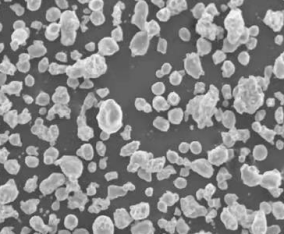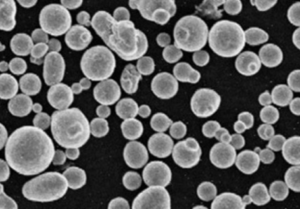Überblick über BNi-7-Pulver
Wenn Sie sich mit Lötlegierungen oder Materialien für Hochtemperaturanwendungen beschäftigt haben, sind Sie wahrscheinlich auf BNi-7-Pulvergestoßen. Es handelt sich um eine spezielle Lötlegierung auf Nickelbasis, die in verschiedenen Branchen weit verbreitet ist, da sie eine ausgezeichnete Beständigkeit gegen Korrosion und Oxidation aufweist und in der Lage ist, starke, zuverlässige Verbindungen zu bilden. Aber
BNi-7-Pulver ist eine Mischung aus mehreren Elementen, darunter Nickel, Phosphor und Bor. Diese Elemente verbinden sich zu einer Lötlegierung mit niedrigem Schmelzpunkt, die sich ideal für Präzisionslötungen in empfindlichen und Hochtemperaturumgebungen eignet. Ob Sie an Luft- und Raumfahrtkomponenten oder Hochleistungsmotoren arbeiten, BNi-7 bietet eine vielseitige Lösung für Ihre Lötanforderungen.
In diesem Leitfaden werden wir tief in jeden Aspekt des BNi-7-Pulvers eintauchen – von seiner chemischen Zusammensetzung bis hin zu seinen realen Anwendungen. Wir werden sogar ein paar Produktvergleiche einfügen und einige der Top-Lieferanten hervorheben, damit Sie genau wissen, wohin Sie gehen müssen, wenn Sie bereit sind, zu kaufen.
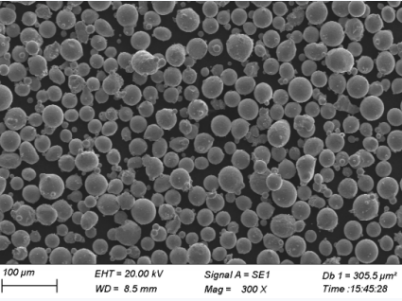
Zusammensetzung von BNi-7-Pulver
Das Verständnis der Zusammensetzung von BNi-7-Pulver ist entscheidend, wenn Sie seine Fähigkeiten voll ausschöpfen wollen. Die wichtigsten Inhaltsstoffe in BNi-7-Pulver sind Nickel, Phosphor und Bor, die sich zu einer einzigartigen Legierung mit wünschenswerten Eigenschaften für industrielle Anwendungen verbinden.
Im Folgenden finden Sie eine Tabelle, die die Zusammensetzung von BNi-7-Pulver zusammenfasst.
| Element | Prozentuale Zusammensetzung (%) |
|---|---|
| Nickel (Ni) | 92.8-93.8 |
| Phosphor (P) | 6.8-7.2 |
| Bor (B) | 0.03-0.06 |
Nickel (Ni)
Nickel, das Hauptelement, verleiht BNi-7 seine ausgezeichnete Korrosions- und Oxidationsbeständigkeit. Es ist das Rückgrat der Legierung und gewährleistet die Haltbarkeit in Umgebungen mit hoher Beanspruchung.
Phosphor (P)
Phosphor senkt den Schmelzpunkt der Legierung, wodurch sie sich leichter in Präzisionslötoperationen einsetzen lässt. Er trägt auch zur Bildung starker, duktiler Verbindungen bei.
Bor (B)
Obwohl in geringen Mengen vorhanden, trägt Bor dazu bei, den Schmelzbereich noch weiter zu reduzieren, wodurch die Legierung beim Erhitzen leichter fließen kann.
Eigenschaften und Merkmale von BNi-7-Pulver
Bei der Auswahl einer Lötlegierung wie BNi-7 ist es wichtig, ihre physikalischen und mechanischen Eigenschaftenzu berücksichtigen. Was BNi-7 für Ingenieure so attraktiv macht, ist seine Kombination aus einem niedrigen Schmelzpunkt, hoher Korrosionsbeständigkeit und starken mechanischen Eigenschaften.
Lassen Sie uns die wichtigsten Merkmale aufschlüsseln, die BNi-7-Pulver definieren.
| Eigentum | Wert |
|---|---|
| Schmelzpunkt | 875 °C – 890 °C |
| Dichte | 8,7 g/cm³ |
| Korrosionsbeständigkeit | Ausgezeichnet in vielen Umgebungen |
| Oxidationsbeständigkeit | Hoch, auch bei erhöhten Temperaturen |
| Merkmale der Strömung | Ausgezeichnete Fließfähigkeit am Schmelzpunkt |
| Verbindungsfestigkeit | Hohe mechanische Festigkeit |
Schmelzpunkt
Der niedrige Schmelzpunkt von BNi-7 (etwa 875 °C) ermöglicht den Einsatz in Lötprozessen, bei denen Präzision entscheidend ist. Dies ist besonders nützlich für Komponenten, die extrem hohen Temperaturen nicht standhalten können.
Korrosions- und Oxidationsbeständigkeit
Eines der herausragenden Merkmale von BNi-7-Pulver ist seine überlegene Korrosionsbeständigkeit und Oxidation, selbst bei hohen Temperaturen. Dies macht es ideal für Umgebungen, in denen Komponenten rauen Bedingungen ausgesetzt sind, wie z. B. in der Luft- und Raumfahrt oder in chemischen Verarbeitungsanlagen.
Mechanische Festigkeit
Trotz seines niedrigen Schmelzpunkts sind die mit BNi-7 erzeugten Lötverbindungen unglaublich stark. Diese mechanische Festigkeit stellt sicher, dass mit BNi-7 verbundene Teile erheblichen Belastungen standhalten können, was es für tragende Anwendungen geeignet macht.
Vorteile von BNi-7-Pulver
Nachdem wir uns nun die Zusammensetzung und die Eigenschaften von BNi-7-Pulver angesehen haben, wollen wir seine Vorteile gegenüber anderen Arten von Lötlegierungen untersuchen. Warum gilt es in so vielen Anwendungen als überlegen?
| Vorteil | Beschreibung |
|---|---|
| Niedrige Schmelztemperatur | Leichter zu handhaben in Präzisionslöt-Anwendungen |
| Korrosions- und Oxidationsbeständigkeit | Kann in rauen Umgebungen ohne Beeinträchtigung verwendet werden |
| Hohe Verbindungsfestigkeit | Bietet starke, zuverlässige Verbindungen zwischen Teilen |
| Ausgezeichnete Fließfähigkeit | Fließt gut bei Löttemperatur, wodurch eine vollständige Abdeckung gewährleistet wird |
| Vielseitigkeit | Kann in verschiedenen Branchen eingesetzt werden, darunter Luft- und Raumfahrt, Automobil und Elektronik |
Niedrige Schmelztemperatur
Im Vergleich zu anderen Lötlegierungen wie BNi-5 oder BNi-2 hat BNi-7 eine niedrigere Schmelztemperatur, wodurch es leichter in empfindlichen oder temperaturempfindlichen Anwendungeneingesetzt werden kann. Dies ist besonders nützlich, wenn mit dünnen oder kleinen Komponenten gearbeitet wird, die sich unter übermäßiger Hitze verziehen könnten.
Korrosionsbeständigkeit
BNi-7 übertrifft viele andere Legierungen in Umgebungen, die anfällig für Korrosion und Oxidationsind, was es zu einer Top-Wahl für chemische Verarbeitungsanlagen, Kessel und Luft- und Raumfahrtanwendungen macht, bei denen Zuverlässigkeit entscheidend ist.
Mechanische Festigkeit
Wenn Sie eine Lötverbindung benötigen, die Belastungen standhält, liefert BNi-7. Seine hohe mechanische Festigkeit macht es zu einer besseren Option für tragende Anwendungen als weichere, schwächere Legierungen.
Vergleich von BNi-7-Pulver mit anderen Nickel-basierten Lötlegierungen
Bei der Auswahl einer Lötlegierung ist es hilfreich, BNi-7 mit anderen verfügbaren Optionen zu vergleichen, um zu sehen, wie es abschneidet. Im Folgenden finden Sie eine Vergleichstabelle zwischen BNi-7 und verschiedenen anderen Nickel-basierten Lötlegierungen, wie z. B. BNi-1, BNi-2, BNi-3, BNi-4 und BNi-5.
| Legierung | Schmelzpunkt (°C) | Korrosionsbeständigkeit | Verbindungsfestigkeit | Beste Anwendungen |
|---|---|---|---|---|
| BNi-7 | 875-890 | Ausgezeichnet | Hoch | Luft- und Raumfahrt, chemische Verarbeitung |
| BNi-1 | 955-980 | Mäßig | Mäßig | Allzwecklöten |
| BNi-2 | 970-995 | Gut | Hoch | Hochtemperaturanwendungen |
| BNi-3 | 970-1005 | Ausgezeichnet | Sehr hoch | Gasturbinen, Motoren |
| BNi-4 | 995-1010 | Hoch | Sehr hoch | Luft- und Raumfahrt, Hochbelastungsanwendungen |
| BNi-5 | 1050-1070 | Niedrig | Sehr hoch | Anwendungen bei sehr hohen Temperaturen |
BNi-7 vs. BNi-5
Während BNi-5 weist eine höhere Festigkeit der Verbindung auf, geht aber auch mit einem viel höheren Schmelzpunkt (1050-1070 °C) einher, was die Verarbeitung in temperaturempfindlichen Anwendungenerschwert. Im Gegensatz dazu macht der niedrigere Schmelzpunkt von BNi-7 es zu einer besseren Wahl für Präzisionslöten.
BNi-7 vs. BNi-2
Verglichen mit BNi-2, BNi-7 hat eine niedrigere Schmelztemperatur , behält aber eine ausgezeichnete Festigkeit der Verbindung und Korrosionsbeständigkeit bei. Wenn Ihre Anwendung eine geringere Wärmebelastungerfordert, ist BNi-7 im Allgemeinen eine bessere Option.
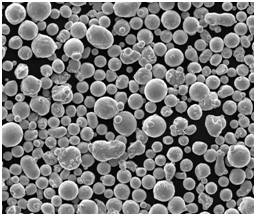
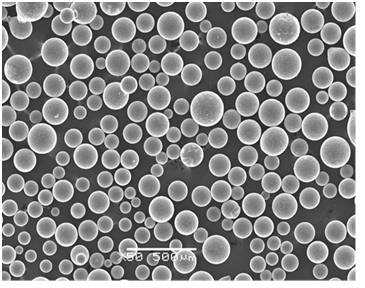
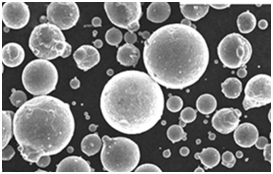
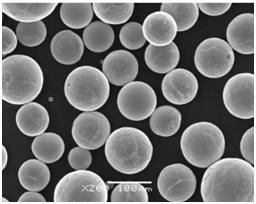
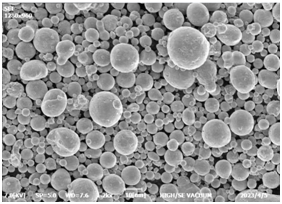

Anwendungen von BNi-7-Pulver
BNi-7 wird dank seiner einzigartigen Mischung von Eigenschaften in einer Vielzahl von Branchen eingesetzt. Lassen Sie uns einige der wichtigsten Anwendungen Anwendungen von BNi-7-Pulver untersuchen:
| Industrie | Anmeldung |
|---|---|
| Luft- und Raumfahrt | Verbinden von Turbinenschaufeln, Motorkomponenten, Wärmetauschern |
| Automobilindustrie | Löten von Abgasanlagen, Turboladern und Einspritzdüsen |
| Chemische Verarbeitung | Verbinden von Komponenten, die korrosiven Chemikalien ausgesetzt sind |
| Elektronik | Löten von Kühlkörpern, HF-Schirmen und anderen empfindlichen Komponenten |
| Stromerzeugung | Löten von Komponenten für Kessel, Turbinen und Kraftwerkssysteme |
Luft- und Raumfahrt
In der Luft- und Raumfahrtindustriewird BNi-7 häufig zum Löten kritischer Komponenten wie Turbinenblätter und Wärmetauschernverwendet, bei denen hohe Festigkeit und Korrosionsbeständigkeit unerlässlich sind. Diese Komponenten arbeiten oft in extremen Umgebungen mit hohen Temperaturen und korrosiven Gasen.
Automobilindustrie
BNi-7-Pulver wird in der Automobilindustrie zum Löten von Komponenten wie Auspuffanlagen, Turboladerund Einspritzdüsenverwendet. Die Fähigkeit der Legierung, hohen Temperaturen standzuhalten und Korrosion zu widerstehen, macht sie perfekt für diese Hochleistungsanwendungen.
Spezifikationen und Standards für BNi-7-Pulver
BNi-7-Pulver ist erhältlich
in verschiedenen Qualitäten und Größenund entspricht einer Vielzahl von Industriestandards. Die folgende Tabelle gibt einen Überblick über Spezifikationen , die Hersteller und Lieferanten typischerweise für BNi-7-Pulver einhalten.
| Spezifikation | Beschreibung |
|---|---|
| Größe des Pulvers | 45-150 µm (typischer Bereich) |
| Konforme Standards | AWS A5.8, AMS 4777, ISO 17672 |
| Verpackungsgröße | Erhältlich in 1 kg, 5 kg, 10 kg |
| Form | Pulver, Paste, Vorformlinge |
| Reinheit | 99 %+ Nickelgehalt |
Normen
BNi-7-Pulver muss die von Organisationen wie der American Welding Society (AWS) und Materialspezifikationen für die Luft- und Raumfahrt (AMS) festgelegten Standards erfüllen, um eine gleichbleibende Qualität und Leistung zu gewährleisten. Zum Beispiel ist AWS A5.8 ein weithin anerkannter Standard für Zusatzwerkstoffe, die beim Hartlöten verwendet werden.
Top-Lieferanten von BNi-7-Pulver und Preise
Die Suche nach einem seriösen Lieferanten für BNi-7-Pulver ist entscheidend, insbesondere bei kritischen Anwendungen. Hier sind einige der Top-Lieferanten von BNi-7-Pulver, zusammen mit einer ungefähren Preisübersicht.
| Anbieter | Preis (pro kg) | Form | Mindestbestellmenge |
|---|---|---|---|
| Vesuvius | $200-$250 | Pulver, Paste | 1 kg |
| Mauer Colmonoy | $220-$270 | Pulver | 5 kg |
| Morgan Advanced Materials | $230-$280 | Pulver, Vorformlinge | 2 kg |
| Lucas-Milhaupt | $210-$260 | Pulver, Vorformlinge | 1 kg |
Preisgestaltung
Die Preise für BNi-7-Pulver liegen typischerweise zwischen 200 und 280 US-Dollar pro Kilogramm, abhängig vom Lieferanten, der Bestellmenge und der Form (Pulver, Paste oder Vorformlinge). Der Preis kann aufgrund von Faktoren wie Reinheit, Pulvergrößeund Bestellmenge.
Vor- und Nachteile der Verwendung von BNi-7-Pulver
Wie jedes Material hat auch BNi-7-Pulver seine Vorteile und Einschränkungen. Hier ist eine Aufschlüsselung der Vor- und Nachteile der Verwendung von BNi-7-Pulver in Hartlötanwendungen.
| Profis | Nachteile |
|---|---|
| Niedrige Schmelztemperatur | Höhere Kosten im Vergleich zu einigen Alternativen |
| Hohe Korrosionsbeständigkeit | Beschränkt auf Nichteisenanwendungen |
| Starke mechanische Eigenschaften | Erfordert spezielle Handhabungsgeräte |
| Ausgezeichnete Fließfähigkeit und Fließeigenschaften | Kann in kleinen Mengen schwer zu beschaffen sein |
Vorteile
BNi-7 zeichnet sich aus durch Korrosionsbeständigkeit, Fließeigenschaftenund mechanische Festigkeit, wodurch es sich für Hochleistungsanwendungen eignet, wo Präzision und Haltbarkeit entscheidend sind.
Benachteiligungen
Es hat jedoch auch einige Einschränkungen, darunter einen höheren Preis im Vergleich zu einfacheren Hartlötlegierungen wie BNi-1 oder BNi-2. Außerdem ist es in der Regel schwieriger, es in kleinen Mengenzu beschaffen, was für Bastler oder kleinere Betriebe ein Problem darstellen kann.
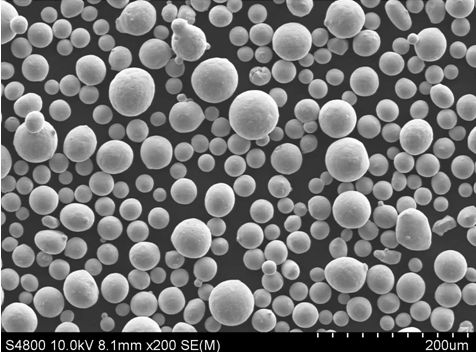
FAQ
F: Was ist der Hauptvorteil von BNi-7-Pulver im Vergleich zu anderen Hartlötlegierungen?
A: BNi-7-Pulver hat einen niedrigen Schmelzpunkt und hohe Korrosionsbeständigkeitund ist somit ideal für Hochleistungsanwendungen, bei denen Präzision und Haltbarkeit erforderlich sind.
F: Kann BNi-7-Pulver in Automobilanwendungen eingesetzt werden?
A: Ja, BNi-7 wird häufig in der Automobilindustrie zum Hartlöten verwendet. Auspuffanlagen, Einspritzdüsenund Turbolader.
F: Wie hoch ist der Schmelztemperaturbereich von BNi-7-Pulver?
A: Die Schmelztemperatur von BNi-7-Pulver liegt im Bereich von 875 °C bis 890 °C, was im Vergleich zu anderen Nickel-basierten Hartlötlegierungen relativ niedrig ist.
F: Eignet sich BNi-7-Pulver für Hochtemperaturanwendungen?
A: Ja, BNi-7 hält hohen Temperaturen stand und hat eine ausgezeichnete Oxidationsbeständigkeitund eignet sich somit für Anwendungen wie Turbinenblätter und Wärmetauschern.
F: Wo kann ich BNi-7-Pulver kaufen?
A: BNi-7-Pulver ist von großen Lieferanten wie Vesuvius, Mauer Colmonoy, Lucas-Milhauptund Morgan Advanced Materials.
Schlussfolgerung
Zusammenfassend lässt sich sagen, dass BNi-7-Pulver eine äußerst vielseitige Hartlötlegierung ist, die sich durch Korrosionsbeständigkeit, Oxidationsbeständigkeitund mechanische Festigkeitauszeichnet und sich somit ideal für eine Vielzahl von Branchen eignet, von Luft- und Raumfahrt zu Automobil. Seine niedrigen Schmelzpunkt ermöglicht präzises Hartlöten, selbst in temperaturempfindlichen Anwendungen.
Ob Sie nun Turbinenblätter, Auspuffanlagen, oder Wärmetauschernhartlöten, BNi-7 liefert konsistente, zuverlässige Ergebnisse. Obwohl es mit einem höheren Preis verbunden sein kann als einfachere Legierungen, machen seine überlegenen Eigenschaften die Investition für Hochleistungsanwendungen mit hoher Belastung.
wert. Wenn Sie auf der Suche nach BNi-7-Pulversind, sollten Sie Faktoren wie Reinheit, Pulvergrößeund den Ruf des Lieferantenberücksichtigen. Mit einer Fülle von Optionen können Sie das perfekte BNi-7-Produkt finden, das Ihren spezifischen Anforderungen entspricht.
